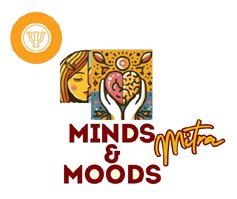Anxiety Counselling: Finding Your Path to Calm
Anxiety is a natural human emotion, but when it becomes overwhelming and persistent, it can interfere with daily life, relationships, and well-being. Anxiety counselling is a highly effective way to manage and overcome these challenges. A skilled psychotherapist or mental health counsellor can provide the tools and strategies needed to regain control and find a sense of peace.
Expert Profile: RRIMI BODALKAR
RRIMI BODALKAR is a Sr. Psychotherapist & Mental Health Counsellor in Nagpur with vast experience in treating anxiety, depression, stress, and other emotional challenges. Holding an M.A. in Psychology (Counselling), PGDMH (Clinical), and being NSDC Certified in Psychometric Analysis & Learning Style Assessment, she specializes in CBT, REBT, and DBT therapies. She has helped numerous clients overcome anxiety, negative thinking, low confidence, insomnia, trauma, relationship conflicts, workplace stress, and academic issues. With a compassionate and professional approach, she empowers individuals to transform their lives and achieve emotional well-being.
Symptoms of Anxiety
Anxiety manifests in various ways, affecting both the mind and body. Recognizing the symptoms is the first step toward seeking help. Common symptoms include:
- Physical symptoms: Rapid heartbeat, shortness of breath, sweating, trembling, and stomach issues. These can be similar to symptoms of a panic attack.
- Cognitive symptoms: Constant worry, racing thoughts, difficulty concentrating, and a feeling of impending doom. This can lead to negative thinking and academic or workplace stress.
- Behavioral symptoms: Avoidance of situations that trigger anxiety (e.g., social gatherings, public speaking), irritability, and restlessness. A confidence building counsellor can help address these behavioral patterns.
Causes of Anxiety
The causes of anxiety are often complex and can be a combination of genetic, environmental, and psychological factors.
- Biological factors: A family history of anxiety disorders can increase a person’s risk.
- Environmental factors: Stressful life events, such as trauma, a death in the family (grief and loss counselling), job loss (burnout counselling), or academic pressure (school stress counselling), can trigger anxiety.
- Psychological factors: Certain thinking patterns, such as perfectionism or a tendency to catastrophize, can fuel anxiety.
Procedures of Anxiety Counselling and Treatment
Anxiety counselling is not a one-size-fits-all approach. A counselling center or psychologist will tailor a treatment plan to your specific needs. The most common and effective therapeutic approaches include:
Cognitive Behavioral Therapy (CBT)
CBT is a practical, goal-oriented form of Behavioral therapy. A CBT therapist helps you identify and challenge irrational or unhelpful thoughts and beliefs that contribute to anxiety. Through structured exercises, you learn to replace negative thinking with more realistic and balanced perspectives.
Dialectical Behavior Therapy (DBT)
Originally developed for personality disorders, DBT has proven effective for anxiety, especially when it involves intense emotions. It focuses on four key skills: mindfulness, distress tolerance, emotion regulation, and interpersonal effectiveness.
Rational Emotive Behavior Therapy (REBT)
Similar to CBT, REBT focuses on how your beliefs influence your emotions and behaviors. It helps you identify, challenge, and dispute irrational beliefs that lead to anxiety.
Other Interventions
- Personal counselling can provide a safe space to explore the root causes of your anxiety.
- Trauma therapy is essential for anxiety stemming from past traumatic events, such as PTSD.
- Mindfulness and relaxation techniques are often integrated into therapy to help manage physical symptoms of anxiety.
Anxiety counselling is a powerful step toward regaining control over life. With the guidance of experienced professionals like psychotherapists, counsellors, and psychologists, individuals can move past fear, stress, and low confidence to embrace a healthier, more balanced future.
FAQs about Anxiety Counselling
How long does anxiety counselling take?
The duration of counselling varies depending on the severity of your anxiety and the type of therapy used. Some people find relief in a few sessions, while others may require long-term support for issues like relationship counselling or life transition counselling.
Can a psychologist help with specific types of anxiety?
Yes. A psychologist can specialize in various areas, such as public speaking anxiety treatment, social skills training, or academic stress. They can also perform assessments like IQ testing, personality assessment, or neuropsychological testing to rule out other conditions.
What’s the difference between counselling and coaching?
While both can help with personality development, counselling (e.g., personal counselling) is therapeutic and addresses mental health conditions, while coaching (e.g., executive coaching or career counselling) focuses on achieving specific professional or personal goals.
Is therapy only for people with severe mental health issues?
No. Therapy is for anyone seeking to improve their emotional well-being. It can help with managing everyday stressors, improving relationships (marriage counselling), or even enhancing performance in areas like sports psychology. Parenting support and support for special needs children are also common reasons people seek counselling.

